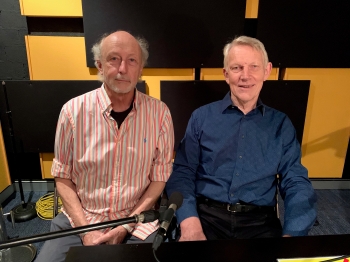Late last year I was interviewed for an Oral History. My colleague in AMOHG Rod Freedman had proposed me as a subject to NFSA, and they had agreed. The only slight caveat was that they only wanted an audio recording – not video. Apparently, they are a bit strapped for data storage space, and reckoned I was no less attractive when invisible. Whatever! The fact is that the vast majority of NFSA’s Oral History collection over many decades are audio recordings. Although most AMOHG members recognise that there is a lot more that can be learnt by seeing a subject tell their story, it’s only recently that recording – and storing – video has been a practical consideration.
Anyway, a date was set for the interview, and it would be in a small audio studio at AFTRS (Australian Film, Television and Radio School). A week or two before the date, Rod came over to my place and ran through my CV which I’d previously supplied him with, and teased out a few other things I’d mentioned that he would ask me about on the day.
What sort of people are picked for Oral Histories? AMOHG has always argued that it’s not just the “captains” it’s the “foot soldiers” too. Sometimes we can learn interesting or unusual aspects of someone’s life; sometimes their account will give a rare description of an obscure or now-forgotten job, or of a specific period or phase of the industry. Sometimes the subject will remember an event (say during the shoot of a film) that another subject has remembered quite differently. Therein will lie a whole new dimension to the incident. (Accounts of the final script edits of Newsfront are one example.)
My experience has been that very few people actually put up their hand and offer to be interviewed for an Oral History. I certainly didn’t, but I know that few others have followed my particular career choices, and so maybe there was something to offer. (There is a summary in the NFSA ‘Search the Collection’.)
When the interview actually took place, just before Christmas, NFSA’s Sean O’Brien had set up the studio for us and, after some sound checks, left us to it. Fellow AMOHG member Julia Overton was a silent observer – as I had been on an earlier interview that Rod had conducted.

We started with my home life as a child: what my parents did, where I went to school, and so on. Rod explained later that this often gives strong clues as to later events. In my case, a childhood interest in photography, and an ongoing interest in communications (attending evening classes in community radio, home video, publishing a newsletter) to counter my formal qualifications in Physics, were obviously early tell-tales.
Since we had been through the key points of my life the week before, there weren’t any questions I was totally unprepared for. Even so, when I read the transcript a couple of weeks later, I was shocked at how hesitant and inarticulate I appeared to be, particularly at first. However, the transcripts for these interviews are left exactly as spoken (as an accurate record – not edited to make them look like well-composed written pieces. As such, I believe it’s not unusual for the transcript to seem a bit bitty (though I’ve dealt with some transcripts that read as perfect written English, in full sentences, without any editing at all). Not mine though, unfortunately.
The interview ran for well over three hours. Uninterrupted! I had been apprehensive about this marathon session beforehand, with nothing but a large glass of water to sip from – but in the event the time raced by. Rod asked the expected questions, often sought clarification or a bit more information before moving on, while I tried to answer his questions in the right level of detail (neither trivial nor arcane). We got right through to my more recent interest in climate change, and renewable energy, and attempts to review energy efficiency in the vaults at NFSA – probably my last paid job, though not the end of my association with the film industry one way or another. It seemed to be the right time to stop.
Although a long-standing member of AMOHG, I’ve conducted very few Oral Histories myself – certainly not “whole of life” ones – though I’ve recorded interviews with various people on specific topics over the years. But in the days that followed, watching interviews on TV news and current affairs, I found I was much more conscious of the relationship between interviewer and interviewee, and of the techniques they used (not just the hard-hitting political grilling, but also the more thoughtful and insightful programs).
The transcript was initially produced automatically by a speech-recognition tool and corrected for spelling by Rod. Apparently, the robot is about 90 per cent accurate but inserts full stops and commas in odd places and struggles with unfamiliar technical terms (eg tell her Sydney = telecine) and proper names: (at lab = Atlab). So I corrected his corrected version and I have that transcript and a copy of the audio recording. My life all run in front of me! And a bonus: my family will now have an account, from the horses mouth, of what it was that Dad did at work!
Within a couple more weeks, NFSA had accessioned the recording and now a summary is up there in their “Search the Collection” on-line catalogue. As with most of their interviews, the summary is all you can see online, but full interviews can usually be made available by contacting NFSA.
See Rod’s comments on the same interview here.
